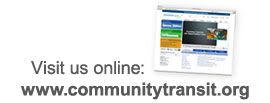Friday, August 7, 2015
Session in Review: How Community Transit Fared with the 2015 Legislature
The historically long (176 days) 2015 Washington State Legislative Session is now best remembered in transit circles for the transportation revenue package passed in early July. That legislation gave Community Transit authority to seek local sales tax funding for increased transit service, which will be decided by voters on November 3.
Here is a recap of legislation affecting Community Transit.
Funding for Community Transit
16-year New Transportation Revenue Package
• Local option authority – As discussed above, this granted Community Transit authority to seek up to 0.3 percent sales tax increase for transit. The Community Transit Board approved a ballot measure for the full 0.3 percent to fund more bus trips on all routes, a second Swift line and a list of other improvements. Measure will be on November 3 general election ballot.
• $10 million in flexible spending for second line of Swift. This funding, which is designated to be received in future biennia, can be used for Swift capital infrastructure (buses and stations) or operations.
2015-17 Transportation Budget Regional Mobility Grants
• Seaway Transit Center, $3 million in 2015-17 and $3.8 million in 2017-19
This transit center, located across the street from Boeing-Everett’s main gate, will serve as the northern terminal for the second Swift line, as well as a hub for all Paine Field area buses, including Community Everett and Metro Transit. Design is underway and project can be completed in 2017.
• Mukilteo Park & Ride, $3.48 million in 2015-17
This commuter park & ride will be located on Bernie Webber Drive on the west side of Paine Field, about a block off the Mukilteo Speedway. It will be primarily used for local residents catching routes to Seattle and UW. This project is awaiting final local matching funds.
Statewide Transit Funding from New Transportation Revenue Package
Gas tax revenue, the primary revenue source for this legislation, cannot be used for any transit projects. These projects are funded through other sources defined in the legislation. Community Transit may compete for some of these grants, but funding is not guaranteed.
• Special Needs Transportation Grants increased from $25 million per biennium to $60 million
• Rural Mobility Grants increased from $17 million per biennium to $30 million
• Regional Mobility Grants increased from $40 million per biennium to $75.25 million
• Vanpool Grants increased from $6 million per biennium to $9.9 million
• Transit Agency Coordination (HB 1842), $5 million over 16 years
• Transit project earmarks, $111 million over 16 years (includes above $10 million for Swift)
Here is a recap of legislation affecting Community Transit.
Funding for Community Transit
16-year New Transportation Revenue Package
• Local option authority – As discussed above, this granted Community Transit authority to seek up to 0.3 percent sales tax increase for transit. The Community Transit Board approved a ballot measure for the full 0.3 percent to fund more bus trips on all routes, a second Swift line and a list of other improvements. Measure will be on November 3 general election ballot.
• $10 million in flexible spending for second line of Swift. This funding, which is designated to be received in future biennia, can be used for Swift capital infrastructure (buses and stations) or operations.
2015-17 Transportation Budget Regional Mobility Grants
• Seaway Transit Center, $3 million in 2015-17 and $3.8 million in 2017-19
This transit center, located across the street from Boeing-Everett’s main gate, will serve as the northern terminal for the second Swift line, as well as a hub for all Paine Field area buses, including Community Everett and Metro Transit. Design is underway and project can be completed in 2017.
• Mukilteo Park & Ride, $3.48 million in 2015-17
This commuter park & ride will be located on Bernie Webber Drive on the west side of Paine Field, about a block off the Mukilteo Speedway. It will be primarily used for local residents catching routes to Seattle and UW. This project is awaiting final local matching funds.
Statewide Transit Funding from New Transportation Revenue Package
Gas tax revenue, the primary revenue source for this legislation, cannot be used for any transit projects. These projects are funded through other sources defined in the legislation. Community Transit may compete for some of these grants, but funding is not guaranteed.
• Special Needs Transportation Grants increased from $25 million per biennium to $60 million
• Rural Mobility Grants increased from $17 million per biennium to $30 million
• Regional Mobility Grants increased from $40 million per biennium to $75.25 million
• Vanpool Grants increased from $6 million per biennium to $9.9 million
• Transit Agency Coordination (HB 1842), $5 million over 16 years
• Transit project earmarks, $111 million over 16 years (includes above $10 million for Swift)
Subscribe to:
Posts (Atom)






